#narrative structure
Text
since im on a roll about tragedies:
i am sick to death of fourth wall breaks that are funny. i want fourth wall breaks that make me want to cry.
give me hamlet looking up during his monologue to see the audience and plead with them for help. give me orpheus, on the road back up from the underworld begging us to make sure eurydice is there, to tell him she is safe. give me orpheus turning when the audience stays silent.
give me someone, bloody and full of tears monologuing to the camera when the narrative has wound itself so tight that they can't escape it anymore.
"youre just watching me. help me. im dying and im rotting and im losing myself and you wont do a thing."
i want the tragedy to be the performance. i want the tragedy to be, truly, in the eyes of the beholder.
#tragedy#writing#writerblr#narrative structure#4th wall break#i just. why must a 4th wall break be funny#is it not enough to sob about being unable to change a thing#is it not enough to have a character wail at you because if you didnt watch they wouldnt be in pain
72K notes
·
View notes
Text
Self Edit Checklist
Structural:
Have I introduced my main character(s) early enough?
Have I introduced the world to my readers early and clearly enough?
Do readers understands my character motivation, protagonist and antagonist? What of their goals, traits (strength and weakness)?
Have my characters grow throughout the story? If not, is it intentional?
Will readers find my characters to be relatable, sympathetic, or interesting?
(I don't have to, but have I done my work to develop empathy for my villain both in myself in readers? Is it a cheap-out sad background story, or explored with more nuance?)
Are there plot holes, inconsistencies?
Are there scenes I overwrote?
Are there scenes I underwrote?
How have the conflicts of the story (external and internal) driven it forward? (Have they?)
What sentences, scenes, chapters don’t move the story along? Cut them.
Are each section/chapter told from its consistent point of view? (No headhopping)
Are there factual mistakes that require further research?
#editing#writing#writing tips#fiction writing#creative writing#writing advice#koda writing advice#writer community#wrtieblr#self editing#narrative structure#writer things#writers on tumblr#writing resources
2K notes
·
View notes
Text
Crafting Future From Ruins: A Writer's Guide to Designing Post-Apocalyptic Technology
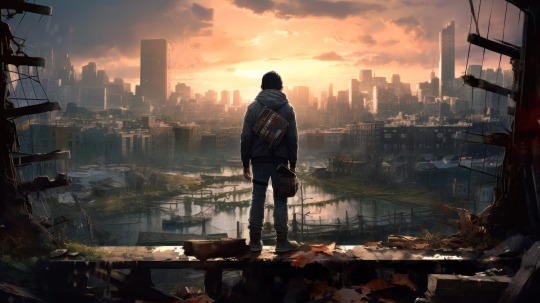
Photo: Standard License- Adobe Stock
Crafting post-apocalyptic tech involves blending creativity and realism. This is a guide to help you invent tech for your post-apocalyptic world:
Tinker, Tailor, Writer, Spy: Start with modern tech. Take it apart (conceptually or literally if you're feeling adventurous). Using the basics, think of how your character might put it back together with limited tools and resources.
Master the Fundamentals: Understand the basic principles underlying the tech you're working with. Physics, chemistry, and biology can be your best friends. This understanding can guide your character's resourceful innovations.
Embrace the Scrapyard: The world around you has potential tech components. Appliances, vehicles, infrastructure - how could these be deconstructed and repurposed? Your characters will need to use what's at hand.
Cherishing Old Wisdom: Pre-apocalypse books and manuals are the new internet. A character with access to this knowledge could become a vital asset in tech-building.
Indigo Everly
#writing#writing tips#creative writing#writing inspiration#fiction writing#fantasy writing#world building#character development#magic systems#fantasy tropes#post apocalyptic#dystopian writing#survival stories#wasteland adventures#creativewriting#storytelling#writing advice#writingcommunity#narrative structure#writingtips
776 notes
·
View notes
Text
Scarlet Hollow decision tree
People occasionally ask to see a decision tree for Scarlet Hollow, so a while back I put one together for episodes 1-4! It’s not comprehensive, as most scenes at this point have at least some variation due to any number of tracked variables, but it accounts for most of the really major deviations.
For those who don’t want spoilers but would like to hear about how we kinda structure the game: I like to talk about it as more of a braid than a tree, which is not a new concept or anything, but I feel like it helps other narrative designers understand how to limit the absolute vastness that you can get with branching structures. The narrative branches off at decision nodes, but instead of continuing down significantly different routes, it comes back together at key moments. So there’s a single narrative throughline to the game-- events unfold in the town and you witness them in some capacity, but your perspective on them, who you’re with, the options available to you, all these are impacted by other choices you’ve made along the way, including the character traits you chose at the start of the game.
It’s not necessarily easier than doing routes, since it means Tony and I have to keep track of a ridiculous number of little variations including one-off dialogue choices players have made AND steering players to the important narrative moments can be tricky, but I think it makes for an interesting player experience! People get so excited when, say, a line at the end of Episode 4 calls back to something they said when they first met Tabitha at the beginning of Episode 1.
ANYWAY, HUGE SPOILERS UNDER THE CUT, do not proceed if you don’t want to know about basically everything that’s currently in the game!


Things start to get a little hard to read from here on out....
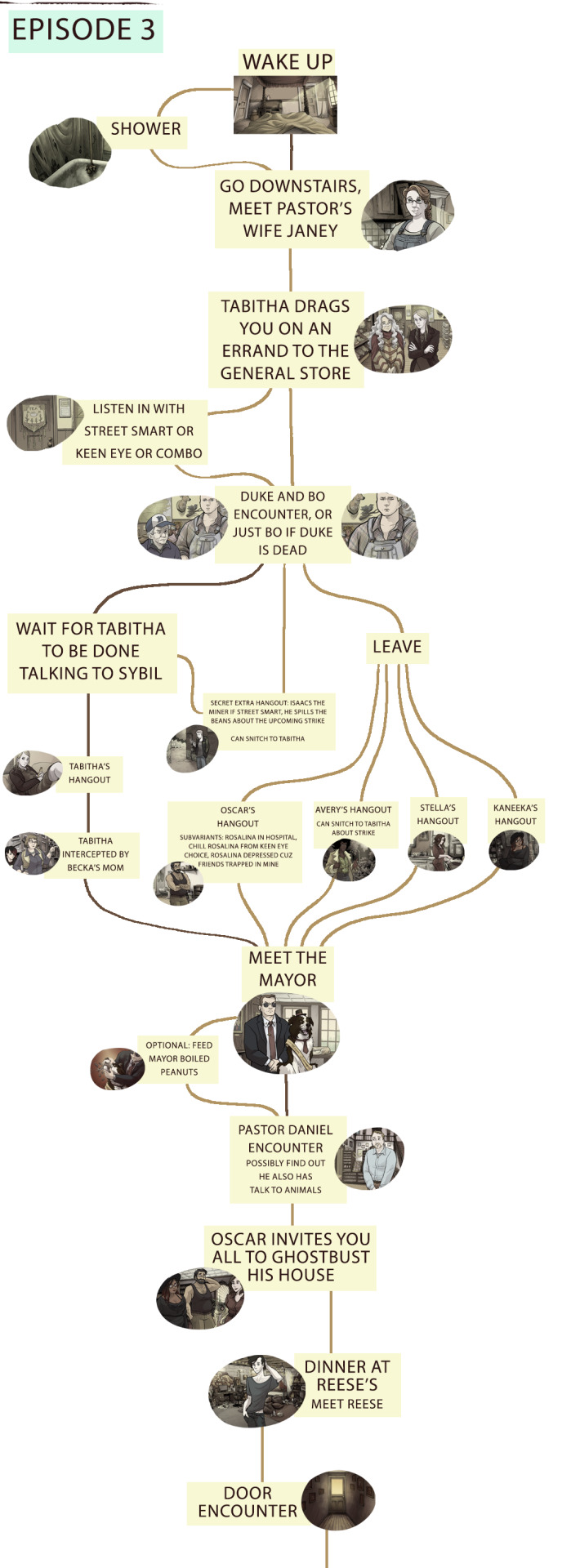

Episode four had to be broken into four images and looks like spaghetti


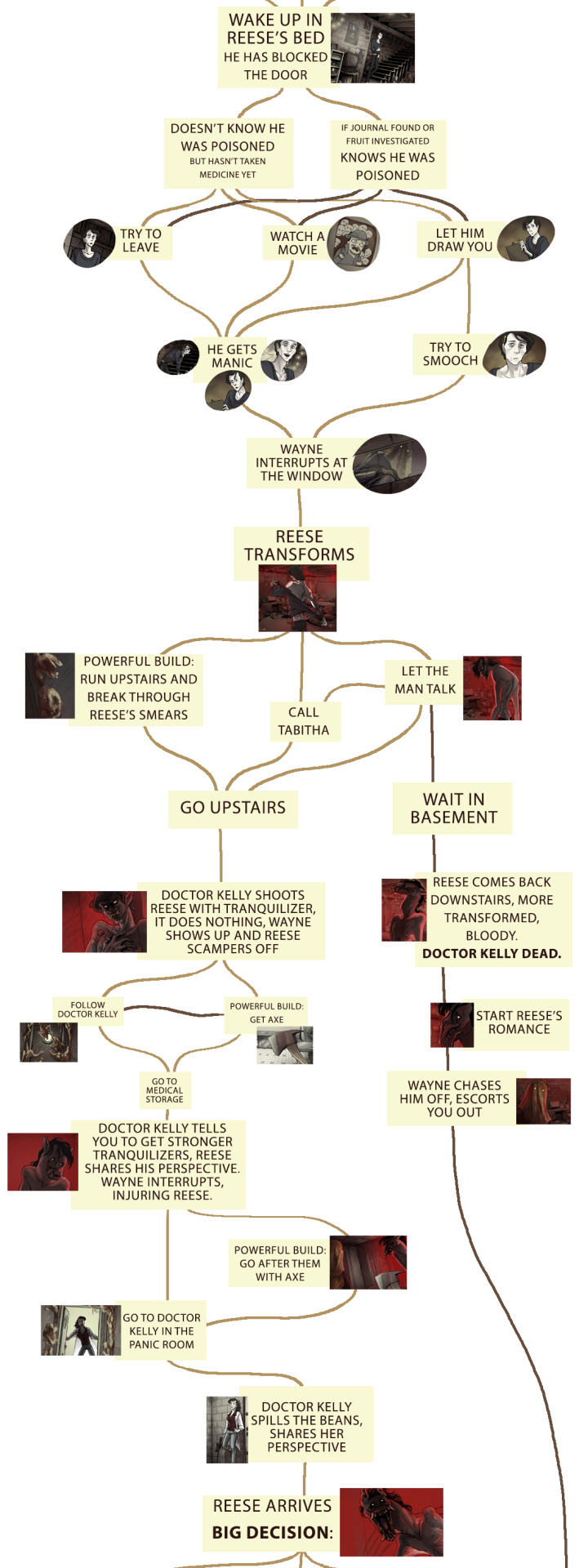
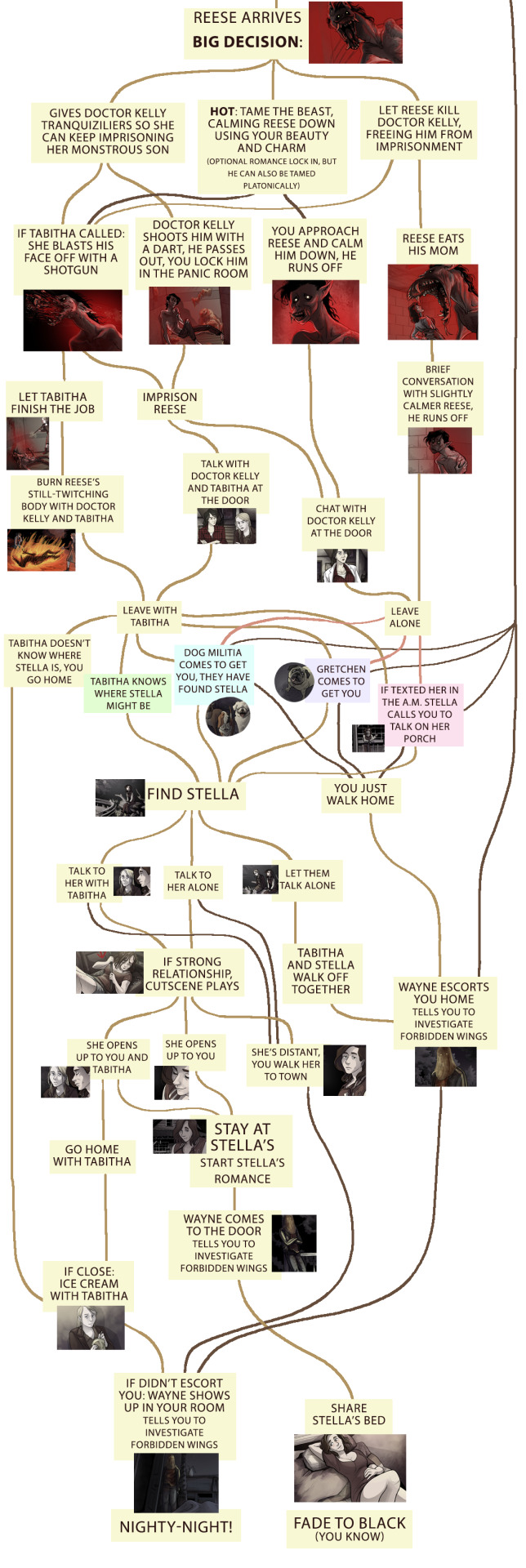
I’ll make another one of these for Episode 5 after it comes out sometime next year! (I know that’s a bit of a wait but it’ll be worth it >:D)
#scarlet hollow#spoilers#visual novel decision tree#narrative structure#video game narrative#we don't use trees like this while we're in development#we tend to just remember all this stuff#or reference the game files if we need calrification!#i made this as a resource for people who don't necessarily read the discord religiously#and wanna know how to get certain outcomes#and to see if a map could be drawn without being too impossible to read#getting there with the episode four stuff.......
590 notes
·
View notes
Text
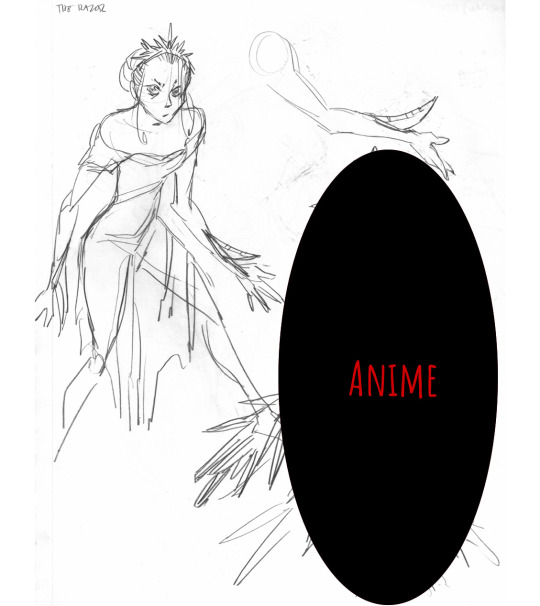
In case you missed it the other day, concept art for The Razor Princess!
There's going to be ~10~ different transformation routes in the full game, each with a different perspective on the world and it's own branching narrative.
We don't want to give too much away about the game's overarching/meta-narrative structure, but it's wildly complicated, and (IMO) really neat.
The Scarlet Hollow relationship system has graduated into a whole new beast.
(PS if you wanna learn about how scarlet hollow's relationship system works we've got a devlog for you here)
#slay the princess#scarlet hollow#narrative design#narrative structure#concept art#stp#indie dev#indie games#gamedev
70 notes
·
View notes
Text
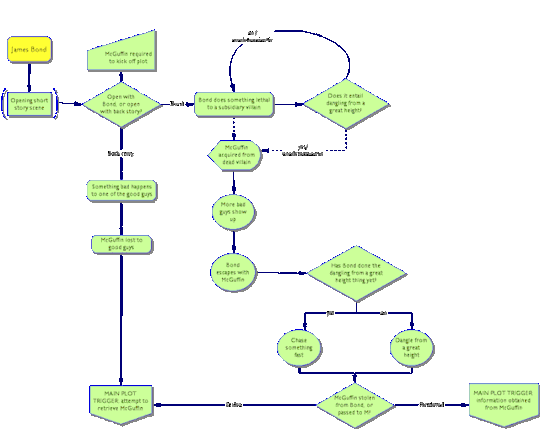
There was this novel I wrote back in 2004/05 that was structured after a Bond Movie, and it burned me out on Bond movies (and ultimately movies in general), but I drew up this flow chart of the opening sequence of a generic Bond movie (pre-Daniel Craig). They spend 20-50% of the entire budget on this one sequence, every time, and there's roughly how it goes (about 80% of the time).
87 notes
·
View notes
Text
I happened to find this interview transcript from ND Stevenson regarding a lot of his work while looking for something else.
And while scrolling down to find what I was looking for, I saw a gif of Catra with a captured Adora from “White Out,” and I had to read the paragraphs around it.
And just…. Stevenson is not a good showrunner. 😬


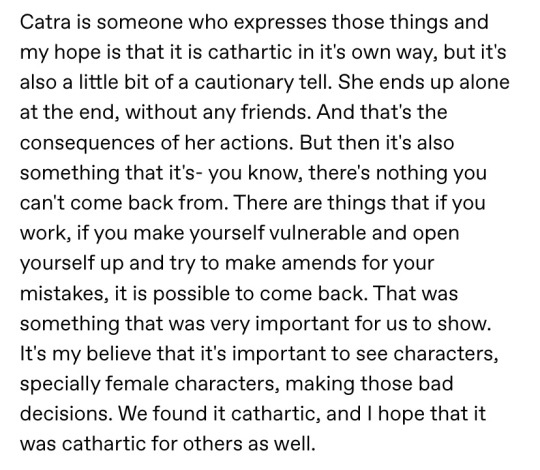
First of all…
Catradora being endgame???
I’m not sure the rest of the crew had been told that!!!!
ND: …But is also, I think, a good thing to see representation of characters making the wrong choices and doing the wrong thing. And Catra is defined by that. This was [something that] the crew [asked about as well]. People would come and they'd be like: "so, you told me that she's gonna join the good guys again, right? She'll be OK? When is that going to happen?" And people started to stop believing me that it was going to happen.
I’m sorry….
What the actual boiling salt???
The other people helping you make this series…
Started to stop believing you that Catra was ever going to be redeemed?????
I don’t care if that actually happened or not.
That’s not something you make up to sound cute!!!
There’s only two options: You didn’t tell the people helping you make the show what was happening in the show, or you don’t think acting like you would treat your fellow crew with that amount of disrespect and disregard for the product makes you look like anything but an idiot who can’t be trusted!
Either way: Bad showrunning!!!
This is not to talk against withholding plot points etc. on a limited basis: The Good Place did not tell most of the main cast a major plot twist until it was time to get ready to make the relevant ep:
(The article and enclosed video have spoilers for the first season of The Good Place)
But the season would not have worked if the writers didn’t know the twist the entire season was building towards. The audience wouldn’t have been able to watch it all again and say “Yes, this makes sense, I know why these background characters are doing this now.”
ND: AJ [Michalka], who voices the character, I would [tell her] "We have a big run for you today, Catra is going to do something new, but I promise that she's going to be OK in the end". And she'll be like: "yeah, sure, you say that every time".
Now, compare that to The Good Place cast reaction to learning they’d had enforced method acting:
In truth, the cast was forgiving after the deception. "It was good not to know until the very end," [William Jackson] Harper told EW earlier this summer. "It's just part of the character to not know. In a way, it's like Ted, Kristen, and Mike made me a Method actor against my will, which is great! Who knows what I would have done?"
Now, potentially, this is just a good PR lie for the press. Although the reactions show in the video support the cast being impressed with the twist, and understanding how it fit into the show, and their role in it.
But again: The Good Place example is not the same as ND withholding all the information relevant to the plot itself to themself. (apparently)
The actor playing the mastermind of The Good Place twist knew the plot, and could create a performance that worked towards that plot.
Michalka was, apparently, not told how Catra’s story was going to go. She had to take everything on Stevenson’s word.
And as someone currently working for a boss where I have to just accept whatever version of reality he’s decided is in play today - that’s fucked up.
(example of my boss: Apparently, we don’t need annual reviews. Except also apparently the sit down I had with him - the daycare owner - and my director after my surgery recovery time where we discussed how ready I felt to return to duties on schedule counted as my review. Except that was in May, and when I mentioned to my director in September I hadn’t had a review since the previous March she agreed with me. Since she was working literally two full time positions I didn’t want to push her to ask the owner about it then…. Anyway, just more of his bullshit.)
Also….
ND: And that, I think, in it's own way can be something that also tells us how to make decisions ourselves. So when you see somebody who we sometimes want to scream [at], sometimes we're compelled to do things that make us a bad friend or bad people. And it's important, I think, to know the consequences of those wrong decisions. [emphasis mine]
I agree.
It’s great to represent characters who make bad decisions, because of their personal traumas.
And if that happens, it’s necessary to show the consequences of those decisions.
I completely agree.
Why the boiling rain didn’t we see Catra suffer the consequences of her leading the war on Etheria?
The consequences of repeatedly placing Adora in deadly situations??
Trying to stop Adora from preventing the reality of Despondos from collapsing???
Edit: Oh, and actively blaming Adora for it, purposefully triggering Adora’s trauma??? The woman she later claims to have “loved the entire time”??????
Where were those consequences, Stevenson???
Can you fucking answer me there???
#salt#narrative structure#showrunner#what the actual fuck#tw babybat swears#because this is employee abuse#just#fucking employee abuse#if true#fuck this
6 notes
·
View notes
Note
Hey uuh so if u don't mind.... I want some writing advice... I have heard that ppl don't often like stories with an ending where the main character gets amnesia... But I can't see my fic go anywhere else (The alternative route is dying and I DO NOT want to go down there...)
... Any... Advice? Thanks in advance!
wow i am so honored that you want my advice arisa! it sounds like you concieved your fic with the ending in mind which is already ten steps in the right direction. also, remember you are writing for YOU before anyone else. yes, you want readers to like the story you craft for them, but in the end it's YOUR story that you want to tell and you're the one who knows how to craft its meaning best!
to begin with, the reason why readers are often disappointed by endings where the character gets amnesia at the end is because they feel cheated of character growth. the point of a story is to develop a character from who they were at the beginning to who they are at the end. when a story wipes all that away, it leaves a dissatisfying, empty taste in readers' mouths and they wonder, "what was the point of reading this, then?" it's much like the ending where the character wakes up from a dream and we realize the whole story was made up. we think, "what did i get so invested in that for?" as we shake our heads and walk away.
now with this in mind, it sounds like your character's amnesia will be the culmination of their development (simply based on how the only other option was death). i'm thinking there will be a sacrifice involved which results in the mc losing memories and therefore exiting the role they filled in the story. sacrificing memories can be a good plot device if you use it correctly. but i think there are some things that should be set in place before you go down that route.
have a character who DOES remember everything the mc went through and who reacts to them in a manner that supports that. you can even hint at it, really (think marinette going to visit fu and smiling at his painting). this will create a link between their past life and current blank slate that satiates the reader, because those lost memories are still meaningful to the protagonist as well as someone who cares about them, even if the mc doesn't know it.
have the character show their growth in other ways that indicate their personality stayed the same, even if they don't remember how they got to that point. e.g., if this person's journey was about standing up for what's right, have them walking down a street, seeing an injustice, and stepping in to right it. then we the readers will think, "aww, they're still the same person even if they don't remember." that's what means the most to us <3
establish whether or not the character will ever get their memories back. is there a possibility the amnesia can be reversed? have the other characters who remember discuss it. is the memory wipe permanent and can't be undone? have the characters who remember discuss it. i love loose ends but i wouldn't recommend leaving this as one, simply because it will add to audience frustration if you don't address it.
cover your bases! make sure we know why the character had to lose their memories, how it completes the point of your story, and who it impacts in what ways. this will all satisfy the climactic decision, as well as just make your story stronger overall!
people like any story that's good, no matter the plot device. it's just a matter of how you use your plot devices to structure your narrative! always remember the basic elements of a story: who is your character, what do they want, and what are they going to do to get it? then, considering this, juxtapose who this person is at the beginning versus who they become by the end. that should give you your entire narrative arc, which you can then close in a fitting way.
thank you for the ask! i truly hope this helped :)))
#ask wackus#writing advice#writing#narrative structure#story structure#character development#amnesia#memory loss#new advice column
54 notes
·
View notes
Note
Hi there ... I have an 80k word manuscript and I'm struggling with too much exposition. I think I'm having hard time adding action because, having already gotten to the end, adding conflict/complication feels totally token and artificial at this point. It feels like doing it for the sake of cutting down exposition, not enhancing the plot. Any thoughts you have would be greatly appreciated.
This is a really interesting ask. I haven’t done writing advice in a while but now and then I get something in my inbox—flattering and terrifying at once—and some of them strike my fancy to answer. I say this ask is interesting for a couple of reasons: 1) it’s clear you’ve really thought about this from a story theory standpoint, and 2) I think there’s some real discussion to be had here about word counts, style, pacing, and crafting plot. I think everything will come back to one question: Whose story is it? So let’s talk.
This ask is a tough ask to answer because I don’t know your style. I don’t know the way you knit words together when story-crafting that makes something distinctly yours. I don’t have your voice to refer to. And part of your answer may lie in understanding whether your exposition is harming your story or whether it's another living part of it.
Story is partially composed of exposition—sorry friend, there’s no getting around that—but how that exposition is delivered can make the difference in whether your story is hobbled by it or flourishing from it. Are you putting your exposition to work in service of your characters’ development? Does all your exposition support the telling of that specific story?
Worlds are places of infinite story. Every place, every stone, every building, every finial on the doorway has a story, let alone each and every person being the center of their own tale, but you’ve chosen a very specific story—a specific person’s story. Choose the elements of exposition that best support that story, and find ways to pass along that exposition that also support that story. Make your exposition pull its own weight.
Are you weaving your exposition into how your characters speak, what they notice, the resources they go to when faced with a problem? Are you crafting scenes and subplots with that exposition that allow you to show character development in their relationships, their sense of belonging, their personal growth?
If your exposition is being put to work in these ways, scenes that seem—on the surface, to the writer who can see the cogs at work beneath the story’s veneer—as though they’re only vehicles for explaining the world are actually helping to buttress up whose story you're telling. It’s the idea that every scene should be advancing the plot, but sometimes “advancing the plot” means advancing a character through scenes that build your world and the context in which your character lives. Their development through interactions with the world and your exposition is just as important as the actions that make up popular culture’s idea of plot.
So then, is your exposition uplifting whose story you’re telling? If it is, is it really a problem? If it’s not, how can you craft scenes around the exposition in a way that caters to the development of characters and their growth?
Here’s one last thing to consider which probably is only marginally helpful: Is your 80k bloated for the genre you’re writing in? The phrasing of your ask feels like you’re unhappy with 80k, but personally, 80k sounds like a pretty good length. If that’s the amount of words it took you to tell the story, then sometimes listening to your story’s heart and knowing when you’ve told what you wanted to tell is enough. Maybe it’s just a function of spinning your exposition into a feature of your story instead of a bug. Think about how you can give it voice and style, and make it really work for its place in your story.
Good luck, writer.
-Pear
Let’s Talk About: Plot – Part Three: Determining Length
Let’s Talk About: Series vs. Stand Alone – Part Eight: A Closer Look At Stand-Alone Books
Creating Conflict
Too Many Subplots?
Understanding Voice
Let’s Talk About: World Building – Part Ten: The Effect of More
What’s Immersive And Why Do I Care?
You’re Too Close – Letting Your Reader Imagine
“Do you enjoy it?”
175 notes
·
View notes
Note
Hii! So I keep seeing memes about how episode 11 is cursed(?), do you have any idea what this means? also im not sure if anyone has asked you already but could you do 23, 24 of the bl drama ask <33
I thought I did a post about it this, but I can’t find it so here we go!
The Dreaded Episode 11 Explained
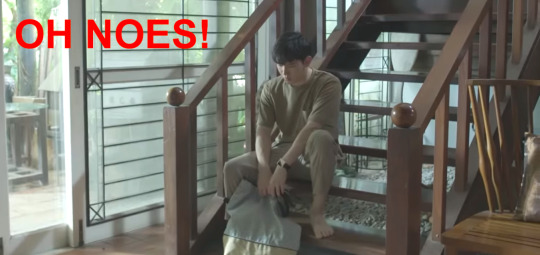

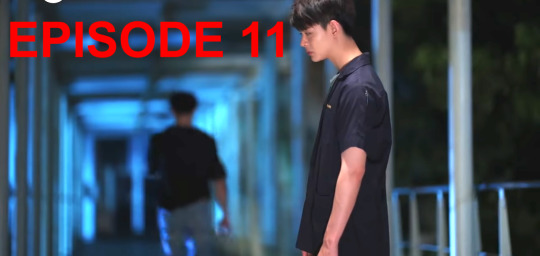

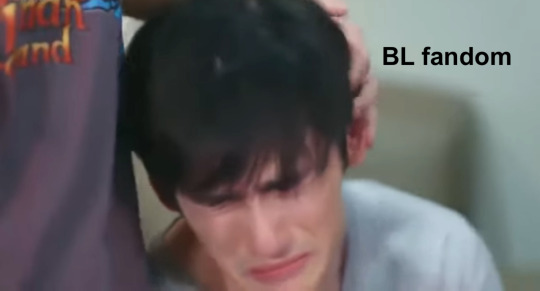
It’s just that standard romance beats and classic narrative arcs mean that in a 12 episode arc (most common in Thai BL) the couple will be torn apart or encounter serious drama and strife in episode 11.
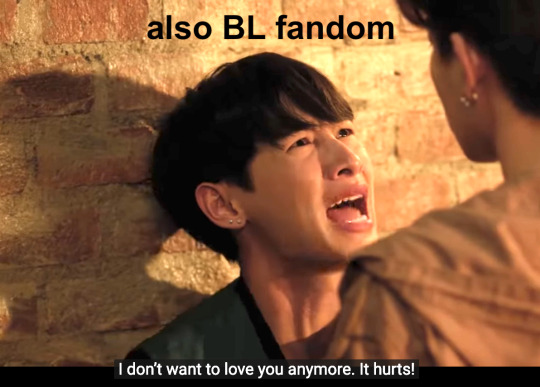
This is a pacing technique so it often conflicts with plot.
When that happens the doom in episode 11 can feel really fake and shoehorned in (cough cough Why R U? Plus & Minus). Just extra angst or manufactured separation that doesn’t make sense for the rest of the narrative, but the producers felt it must be there or watchers would lose interest.
Taiwan and Vietnam will often (but not always) also follow this model just with ranging numbers of eps. So for them, doom usually falls on the second to last ep. It’s in this one you’ll see the seme cry, if the seme is gonna cry at all.
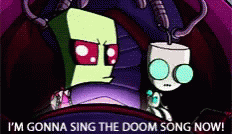
Korea prefers to put doom in the last episode of a series (no matter how long that series, het or BL) and then resolve it (if they choose to resolve it) within the final 5 minutes - often with a time jump (of at least a year).
I call this “the dreaded time jump finale.”
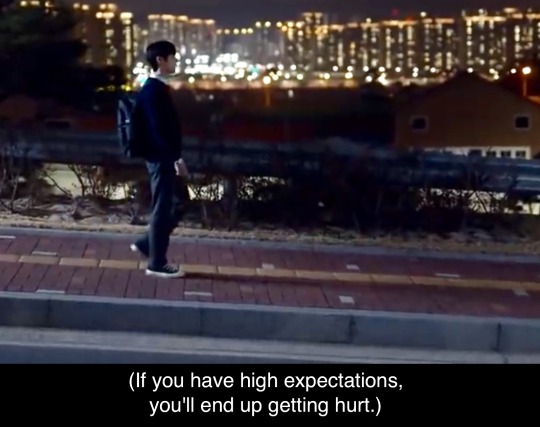
Because they use 3 act or 4 act or 5 act or intentionally experimental narrative structure (to the point where the unexpected is now expected) plus mostly movie length, Japan does not do this or have a predictable doom cycle.
(source)
#asked and answered#thai bl#taiwanese bl#narrative structure#korean bl#episode 11#doom doom doom#japanese bl#tharntype#sotus#Why R U
61 notes
·
View notes
Text
Let's talk about how to write a TV episode which resets your series' entire game:
2 notes
·
View notes
Text
"this is just hadestown" "this is just the guy who didn't like musicals" "this is just fleabag" consider though. consider.
i want more. i want to swallow the narrative whole and see what that does to it i want an endless stream of tragedy to wear thin until it bursts at the seams i want to consume that which i love until im sick with it why would i stop at the movie or the musical or the opera or the tv show or the video game?
can i not be greedy for things that make my heart sing? am i not full of teeth and want and longing for stories? does it matter that its not a lute or a theatre or a fire? if i want to consume something that cuts me clean through, why would i be satisfied with what is already here?
give me more. make me weep.
#something something the tags are repetetive#something something the point is the longing#the point is the pain#narrative structure
40 notes
·
View notes
Text
Miles Morales & Co. are Fictional Characters Fighting Their Own Narrative Structure, Who Will Win?
youtube
Brigitte Empire! She just moved to mainland Europe and could use some clicks and attention, as could I! So, first, let her talk for a bit about how important Miles, and his new take on the franchise are...
And then, if ya got a minute, let me unpack the significance of the plotline he and his friends are stuck with...
And I do mean stuck! There is a literal web of universes involved here, which the Chief Spider Cop has decided is held together only by the sameness of their stories and the commonality of their losses.

All your suffering has a purpose, because if you don't suffer, it all ends, all of it. This web has a lot of spiders in it, and none of 'em are getting out. So what's one father, more or less?
Did you notice how Peter's narrative arc in the Tom Holland Spider-flicks became a cul-de-sac? Like, we skipped the origin story, because we already know it, and that seemed reasonable enough at the time. A good idea, even. Then, in the end, it turns out the whole thing was an origin story, and he's right back where he started, but worse. It's as if the prize at the bottom of your box of Cracker Jack was another, shittier box of Cracker Jack, with raisins or something.
I know a lot of people seem perfectly thrilled with it, but I'm not gonna eat Cracker Jack if I don't like how it tastes, and the MCU version turned on me. These narrative choices were not about telling a good story or being true to the characters we know and love. This was a corporate, profit-driven decision, spurred on by contractual obligations, copyright entanglements and fan reactions.
For a certain (loud) portion of the fandom, Spider-Man is not defined by his personality, or his Spider-powers, or anything intrinsic, but by his circumstances. (To keep this simple, we will be including "has white, male privilege" as part of his circumstances, because any other identity gets parsed as "political" and that's just a mess.) The ideal Spider-Man is a brilliant teenager with a lot of responsibilities, a shitty job, a dead uncle, a hot girlfriend, a guilt complex, and few places to go for help. Any deviation from that isn't a fun new story to explore, it's wrong. And, much like Miguel, they will demand a course correction to get it right - no matter how brutal, stupid, or out-of-character it is.

"Hey, Peter, given how much you love and respect me, you wouldn't break a promise to me and take my agency away trying to keep me safe when I specifically asked you not to, right?" "Ordinarily, no. But Sony needs the option to get rid of you or recast you if you're too expensive, or too ethnic, or too upsetting to the fandom. You get it?" "...Put me down, you Spider-Jerk."
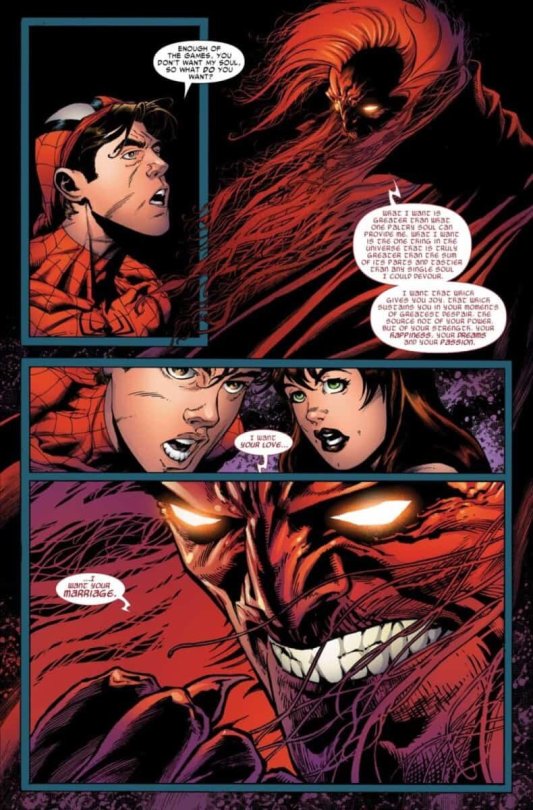
"Listen, Mephisto, I'm not saying 'no,' but could you buy us a drink before we get into anything complicated?" "Honey, he means he wants a retcon." "Oh. That seems like an odd thing for the devil to want. But, OK!"
I could speculate for pages about why that is, but the "why" part doesn't matter much to Miles & Company. Miles is counting down the hours to another "canon event" that will take out his father, and they've all got to decide whether they're gonna risk the fate of the Multiverse or stick to the narrative. There are suggestions that these things are not written in stone, that the story can be changed, but in the end, Miles is trapped in a crapsack universe that he seems to have ruined just by existing in the right/wrong place at the right/wrong time - and he has no way out yet.
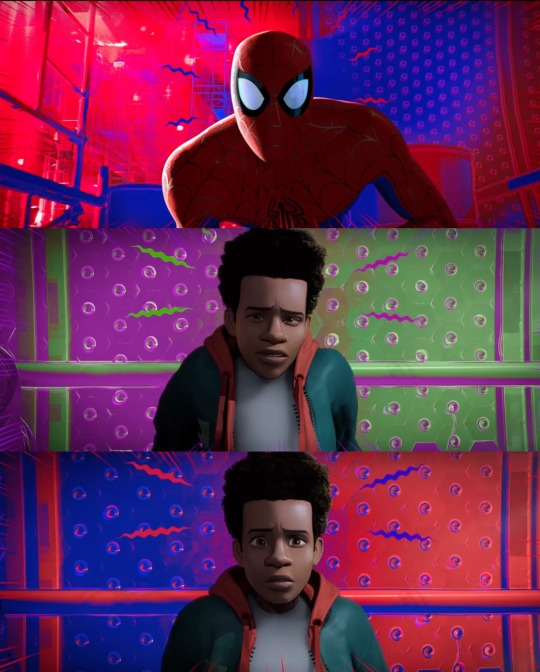
This is where Miles' fate changes, when he talks to his universe's Spider-Man, not when he gets bitten by the glitching spider. No more villain colours!
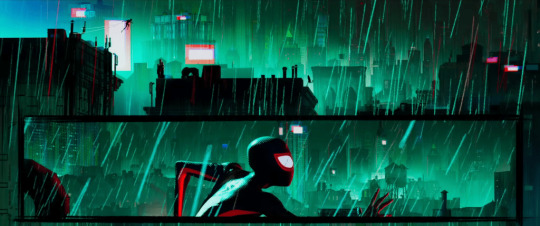
Kinda went too hard on Earth 42 here, in my opinion. It didn't need the grunge filter and the rain. Our Miles' universe had a criminal overlord who killed Spider-Man with impunity, threw a party about it, and invited Peter's widow - who attended! I don't think MJ would've done that unless she didn't have any choice. Two-parent-household and private education aside, our Miles isn't in such a hot place either.
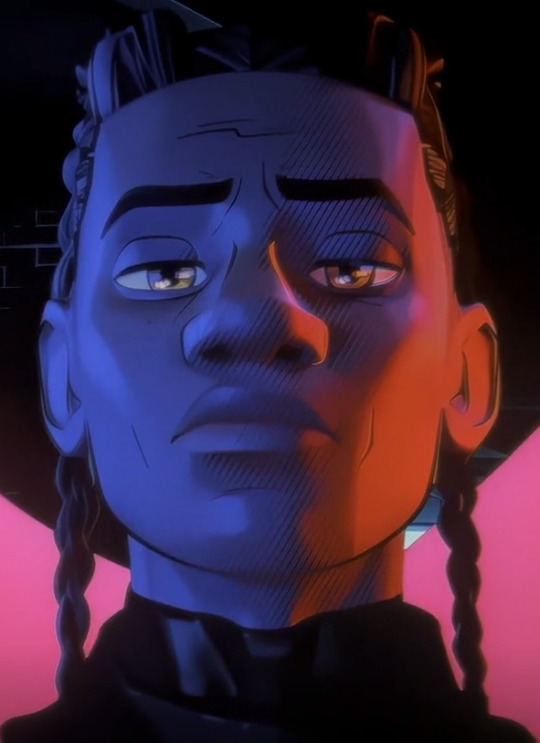
So Miles 42 has braids and a dead dad, and a live uncle, and probably not a lot of options. If his family needs the money, or if anyone in it ran afoul of Kingpin (or whoever's in charge there) for any reason, he's got to fall in line and follow orders if he wants to stay alive. We've all seen what happens when you cross a crime boss.

That's odd, though, isn't it? According to Miguel, Miles was never supposed to be a Spider-Person at all, and yet the canon events are popping up for him right on schedule. Dead uncle? Check!
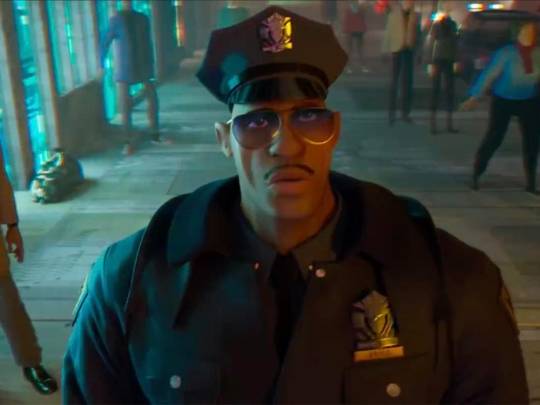
Dead police captain? Pending!
We've also seen (we think) what happens when you screw up the established Spider-narrative...

Oh, Hobie, my man, you have no idea how right you are, but I think the folks writing your dialogue do. We're dealing with a metaverse, and the meta text is evident. Capitalism eats divergent Spider-Beings. Spider-People exist in movies, comic books, and other products that are sold. If people don't buy them, or if the loud fan faction makes enough noise that it seems like people won't buy them, their universes are toast.

We don't talk about Andrew, ew ew ew. We don't talk about Andrew!
Miles, as a character, doesn't know it, but he's up against interests who only want to see the same story, over and over, forever. His challenge is not to save his dad, that's incidental. He's gotta prove he can be his own person, choose his own path, still tell a good story, and still be Spider-Man. His job is to save the franchise, if he, and the most diverse cast of Spiders ever, can manage it. Because being stuck in a groove like a skipping record in perpetuity will definitely kill it.
No Expectations, right?
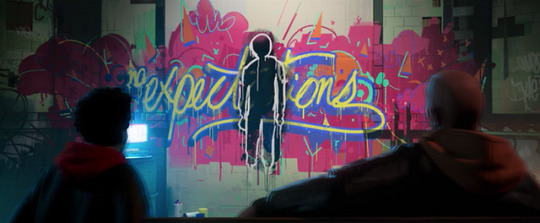
Wouldn't it be nice for Spider-Man, and for the people who write, draw and animate him, and for all of us, if we could consume a Spider-story without demanding it land Every. Single. Beat. the same as every other Spider-story, and with no idea what was gonna happen next? Do you remember not knowing what was gonna happen next? Before everything was a remake, a franchise or a reboot? Or, maybe you were just too little to know everything was a remake, a franchise or a reboot. It was nice, though, yeah?
If Miles here sticks the landing in Part 3, he might be able to do that for us. At least, he'll leave open the possibility, and we'll have to see if anyone is able to take advantage of it.
(On a personal note, I kinda feel like these movies are comin' for me. And, like, I'm thrilled - apparently, this is an idea whose time has come - but I'm terrified. Because Sony is gonna deliver its message to a ready-made fandom in real movie theatres with a real advertising budget before my cast of idiots can even figure out The Hero's Journey is tryin' to eat them and their universe too. Oh well, if you like my writing, you might go there and read more. Or at least like and reblog if you want more Spider-stuff. I am paying attention, and I can do a series of deep dives on Spider-choices and the illusion of choice, if ya want.)
#Youtube#if i hit ctrl z my whole post vanishes and i can't ctrl y it back huh tumblr? jesus#brigitte empire#across the spider verse#across the spiderverse#miles morales#uncle aaron#one more day#spiderman in general#MCU#long post#deep dive#MJ#peter parker#metaverse#narrative structure#it's a metaphor for capitalism
6 notes
·
View notes
Text
Accidental Transformations in Fiction: Pros and Cons to Consider
If you're considering including a supernatural transformation in your story, it can happen in several ways. One way is for your character to accidentally transform. Here are some positives and negatives to think about before you decide:
Positives:
Adds unpredictability: Accidental transformation can add an element of surprise to your fiction. Readers may be more likely to wonder what happens next.
Creates chaos: A sudden transformation would likely throw your character's life into disarray, which can make things interesting. They might need to learn their new powers and adjust to life with new rules, disadvantages, or advantages. As a writer, you can explore how this upends your hero's life.
Feels natural: Sometimes accidental transformations feel natural and less contrived way of gaining supernatural abilities. It might make things a little more believable.
Negatives:
Can feel contrived: In the same breath, accidental transformations can also give a coincidental tone. It can feel like an easy way out for the writer when giving characters supernatural powers. You might leave readers wondering if you're trying to move the story too quickly.
Lack of agency: The character didn't choose this. They have no control over it. Sometimes giving your character a choice to get themselves into trouble is a great way to create conflict. They got themselves into this mess now they need to get out. Accidental transformations can make it seem more like a character is a pawn in the story instead of a participant.
Limits exploration: Random transformations limit the ability to explore themes like fate and destiny.
Accidental supernatural transformations can be a great way to add unpredictability to a story. It can make it seem like a character is falling into a magical world, and the reader could too. Consider if it is a natural fit for your story and allows you to expand and express your story's plot. Happy writing!
#writing#writing tips#writing advice#fiction writing#fantasy writing#supernatural#transformation#plot devices#storytelling#storytelling tips#narrative structure#character development
63 notes
·
View notes
Note
RE: stories without conflict: my mind goes to the kind of children's science books that give you a narrative of, say, the history of life on earth, or what happens in some meadow over the years, or the development of the early universe - not anthropomorphizing things, just giving a sequence of events that flow from each other in narrative style. Those don't have conflict in the sense you defined - there are no characters capable of wanting things - but perhaps they don't count as "stories"?
hmm, that's an interesting example yeah! i definitely think those are narratives of some kind we should be able to acknowledge. i guess those truly are stories without dramatic conflict.
it's interesting because it is definitely possible to add conflict to a story about nature. nature documentaries of the David Attenborough kind do this all the time: take footage of different animals, edit together as if the same animal, and the narrator and music help sell it as a story. there are a few genres of such story: the mother attempting to provide for a child, the powerful predator seeking prey or conversely the desperate prey seeking escape, the encroachment of human activity on pristine nature, or 'gee there's a lot of those little guys' - most of them turn the animals into characters with certain desires so we can see how they struggle to achieve them in nature.
when you tell history, you can definitely present it without dramatic conflict. i was recently reminded of the film Das Boot, which led me to read about the submarine U-96, and the story as told in the encyclopedia goes broadly like...
The next day, U-96 encountered the un-escorted British passenger steamer Almeda Star of 14,936 GRT. A first torpedo was launched at 07:45, hitting the ship amidships, causing her to stop. A second torpedo hit the ship astern 20 minutes later, but still did not sink. Two more torpedoes were needed before Almeda Star sank in position 58°16′N 13°40′W, three minutes after the fourth and last torpedo was launched at 13:55.[12] All passengers and crew, in total 360, were lost.
i.e. a series of episodes that go "submarine finds ship, attacks it with x weapons, ship sinks in y minutes, z hundred people die". despite, or perhaps because it is stripped of most of the elements of a narrative such as characters, the story is still kind of sickening: for me at least I'm left wondering what would motivate these 40-50 men to kill literally thousands of largely defenceless people over the course of the war, and my brain becomes numb to numbers of deaths. (I guess that's what the film is supposed to answer!)
i guess with things like timelines of the Big Bang, the characters and narrative in a lot of tellings instead centres on the scientists and their quest for knowledge. but there's definitely a point here like, this is a well established mode of telling stories which usually avoids dramatic conflict. interesting, interesting! a timeline of the Big Bang is all about causality and basically absent dramatic conflict, unless you want to project on like, the electrons. this impersonal quality is I guess the major contrast to just about every religious creation story I know of...
anyway what the stories rest on is the claim to being true. without that they're just numbers and funny words. but that is enough, it seems!
reaching for the style of such 'historical' stories, such as disaster reports, can actually be a very effective device in a 'standard' story with characters and desires, such as the Gun Devil sequence in Chainsaw Man, the @mysteryfleshpit which is a whole story written in this mode, or to a certain extent the SCP wiki (although most entries do have dramatic tension: the Foundation is trying to describe and contain the object, here's how it goes about it). and there's also like, 'pure worldbuilding' types of book; when i was a teenage warhammer fan I was very into the kind of 'in-universe' books of the Black Library such as Xenology, even the ones without any sort of direct narrative at all like the Imperial Infantryman's Uplifting Primer. the Primer has neither characters nor really a timeline for causality to play out, but I would still think of it as presenting a story, a darkly funny one about the miserable world experienced the poor fictional soldier issued this book.
you could totally fit such a story into a kishoutenketsu structure if you wanted. in fact it's kind of the natural structure of a disaster report: you have the evolving 'situation normal' before the disaster (ki and shou), the slowdown as we introduce the elements that caused it becomes the ten, and then the disaster itself and its aftermath is the ketsu? though you could argue that a disaster report still has a lot of dramatic conflict, insofar as the people want to stay alive and sail the boat/run the power station/whatever else and this is the tragedy of how they fail.
very interesting anon ty for pointing this angle out!
38 notes
·
View notes
Text
kishōtenketsu
Materials:
The Skeletal Structure of Japanese Horror Fiction: Digging into the Guts of Japanese Folklore by Rudy Barrett
The Mindset of Japanese Arguments: How Japanese People Argue Differently by Rudy Barrett
漫画の基本「起承転結」の書き方を例文つきで一発理解!
“Because of the fact that the Ki, Ten, and Ketsu sections all introduce new elements, this writing style can be particularly confusing to a Western audience. Western, especially academic, writing is often used to tackle one major topic in a piece of prose and really can't process scaling to three topics—especially if they are given equal weight”.
Videos:
Kishotenketsu: East Asia’s Formulaic Secret To Unique Stories | 4 act story arc
Anime’s Hidden Four Act Story Structure
The Four Act Structure in Attack On Titan
5 notes
·
View notes